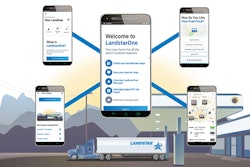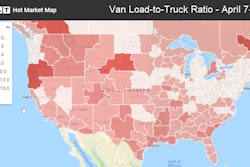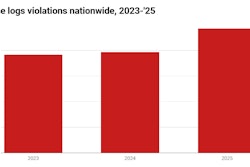Prasad Gollapalli, the founder and CEO of the Trucker Tools app and freight platform, presented something of a roundtable discussion with two owner-operators Thursday at the Mid-America Trucking Show — Greenmiles small fleet owner-operator Shain Ferris of Springfield, Missouri, and owner-operator Tamara Brock, the latter working with LTI Trucking Services out of St. Louis.
Central to the discussion, dubbed “The Battle for Profit,” was just how Trucker Tools and its Smart Capacity and Load Track functionality are attempting to address four key owner-operator and small fleet issues:
 Trucker Tools Founder Prasad Gollapalli
Trucker Tools Founder Prasad GollapalliDetention
Gollapalli and company studied Trucker Tools’ users’ time spent at shipper and receiver facilitites and found “how long are they staying” in total there – on average, the time was close to four hours, he said, two or three hours beyond the time truckers often give customers to load and unload without compensation for delays.
Owner-operator Brock urged app updates that, for any load booked in the platform, might “automatically track that time, automatically negotiate for us and give us that payment for the time over what’s allowed. That would help with some of the issues.”
Over time, such built-in detention-pay collections might push shippers, receivers and brokers to do what Gollapalli has found is the central issue with detention for carriers: In Trucker Tools surveys, most carriers rank getting the delays to a minimum above getting compensated for them.

One audience member took that further, however, and linked the two priorities inextricably. “I say no detention, period,” she said. “Every time you make a delivery, if you’re giving them two hours, look at all the money we’re giving away. … I’m getting raped, basically.”
Count Ferris among the carriers to endorse a preference to just keep load/unload delays to a minimum. He’s “hoping some of the tools coming into the market now [can] help to collect on detention due or, in preference, just eliminate it. We want punitive rather than compensatory rates for it,” i.e. detention rates that go above and beyond compensating for lost operating time, “but we’d rather not to have to collect detention. I’d love to see no detention in the industry.”
 Owner-operator Tamara Brock (left) and small fleet owner Shain Ferris
Owner-operator Tamara Brock (left) and small fleet owner Shain FerrisNo matter what is paid, Gollapalli emphasized, “it’s affecting your driving time. You’re losing the next load and it snowballs into something more. When we spoke to customers, [most said] I’d rather have the broker work with me and talk to the shipper as my time is coming up to two hours.” Tracking functionality in the Trucker Tools and other mobile freight platforms can “make it transparent for all the parties involved in this process – that this trucker is waiting for two hours, is coming up on two hours, is waiting for four hours.”
Trucker Tools, Gollapalli added, is tracking facilities’ average delay times and with near-term-future updates will share those with carrier and broker users within the company’s freight platform to allow carriers to make a more informed decision before they take a load, and brokers to see clearly how their shippers/receivers are performing.
Parking
Most any trucker knows that parking “is a huge issue,” in the words of small fleet owner Ferris. “most of our drivers are finding that if they want to find a spot without having to pay for it in advance, they start the day earlier and stop by 3 or 4 in the afternoon – or there’s nowhere to park.”
Just as “detention pay in the contract [can be] a good negotiating tool for them” in rate negotiations to address it up front before the problem occurs, he said, parking might be thought about similarly.
For Brock, safety looms paramount in parking considerations. It’s “a big concern for us,” she said, and though the move toward reservations with payment involved does seem to be gaining plenty steam, she added, “I think we pay enough for things as we go about our day.” She hopes this trend is reversed or at least stabilizes.
Shippers and receivers can be part of the solution, she added. “I think it’s ridiculous you have such a large facility and we’re not able to come to your place until an hour from the appointment time.”
Gollapalli hopes to include information about available parking when more robust shipper/receiver facility information is added to the app, which already includes basic truck-stop/rest-area information and, for it’s worth, increasingly parking-off-limits Walmart locations.
App overload
Broker- and/or shipper-require download of proprietary or third-party smartphone apps has become a principle nuisance in the freight world for owner-operators, well-documented when it comes to tracking apps in the December issue of Overdrive.
It’s gotten so bad in our society that “there are websites that provide actual therapy for app overload,” Gollapalli says. “There are therapists for this. For all of what the smartphone has done [positively] for us, it’s also causing a lot of stress with the multiplicity of systems.”
“We see that on a regular basis,” Ferris says. As a small carrier, Greemiles executes a lot of its business processes through apps on smartphones or tablets. When a new owner-operator comes onboard, he has to download “five different apps that we use ourselves.”
It would “absolutely be advantageous to find a majority of tools that we need daily on the road in one place,” he added, something Trucker Tools has attempted to move toward from its inception nearly a decade ago as a driver app.
How does a small carrier or owner-operator counter what a shipper or broker is wanting him to download? asked Gollapalli.
“I don’t know there is a counter to it, really,” Ferris said. “I recommend saying, ‘hey, we prefer this or that app,’ or ‘this tool is becoming more ubiquitous in the industry.’ We’d like to have only one or two apps on the phone. Ultimately, though, if they want us to use the app, we either take the app or we don’t get the load.”










